The Chinese Communist Party (CCP) is giving money to templegoers in Taiwan and subsidizing trips for them to visit China, a Taiwanese intelligence official said yesterday.
The CCP is partially or fully funding Taiwanese’s trips to China to attend religious pilgrimages and events as part of “united front” efforts, the source said, adding that it incentivizes the recruitment of more participants by paying borough wardens and temple heads based on the number of people who sign up for trips.
The CCP has been targeting Taiwan’s most popular temples and recently organized a trip to attend an event in China’s Fujian Province celebrating the sea goddess Matsu’s (媽祖) 1,065th birthday, the source said.
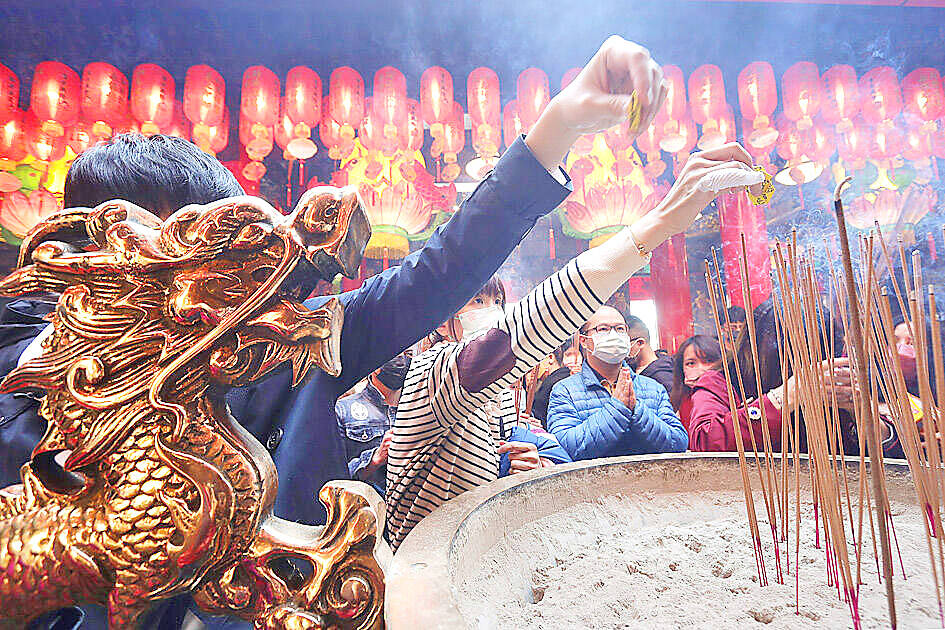
Photo: Chiang Ying-ying, AP
Templegoers have also been invited to visit cultural sites in China to “promote a language, ancestry and cultural roots shared between people on both sides of the Taiwan Strait,” they said.
“The CCP pays NT$1,000 per person recruited by temple and borough heads to attend these events. If they manage to sign up 100 people or more, that rate doubles,” they said.
“Participants at most pay for their airfare. Everything else is covered after their arrival,” the source said, adding that officials from China’s Taiwan Affairs Office often show up to speak to the Taiwanese participants.
“Some borough wardens see this as a free trip to China, while others avoid traveling with the groups, seemingly concerned about being seen as group leaders. Instead, they meet up with the group later in China to create the impression that they are traveling separately,” they said.
Officials have found examples of such trips by temples large and small throughout Taiwan, including in Miaoli and rural parts of Tainan, they added.
“Accepting CCP-funded hospitality does not align with the norms of legitimate exchanges,” they said.
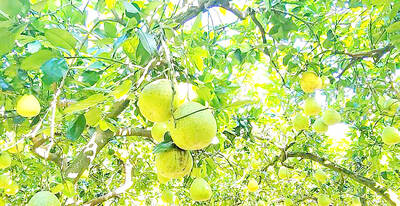
NEW AGREEMENT: Malaysia approved imports last year after nearly two years of negotiations and inspections to meet quarantine requirements, officials said Up to 3.6 tonnes of pomeloes from Taiwan cleared Malaysian customs on Friday, in the first shipment of Taiwanese pomeloes to Malaysia. Taiwan-grown pomeloes are popular in domestic and overseas markets for their tender and juicy taste, the Ministry of Agriculture’s Animal and Plant Health Inspection Agency said. The fruit is already exported to Japan, Canada, Hong Kong, Singapore and the Philippines, it added. The agency began applying for access to the Malaysian market in 2023, compiling data on climate suitability, pests and diseases, and post-harvest handling, while also engaging in nearly two years of negotiations with Malaysian authorities and submitting supplementary
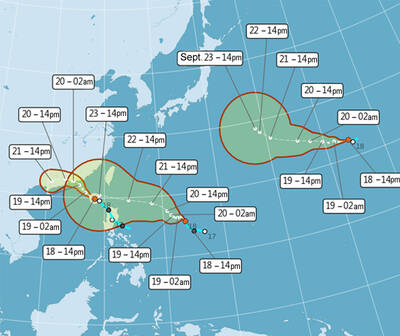
PEAK MONTHS: Data showed that on average 25 to 27 typhoons formed in the Pacific and South China seas annually, with about four forming per month in July and October One of three tropical depressions in the Pacific strengthened into a typhoon yesterday afternoon, while two others are expected to become typhoons by today, Central Weather Administration (CWA) forecaster Lee Ming-hsiang (李名翔) said yesterday. The outer circulation of Tropical Depression No. 20, now Typhoon Mitag, has brought light rain to Hualien, Taitung and areas in the south, Lee said, adding that as of 2pm yesterday, Mitag was moving west-northwest at 16kph, but is not expected to directly affect Taiwan. It was possible that Tropical Depression No. 21 would become a typhoon as soon as last night, he said. It was moving in a
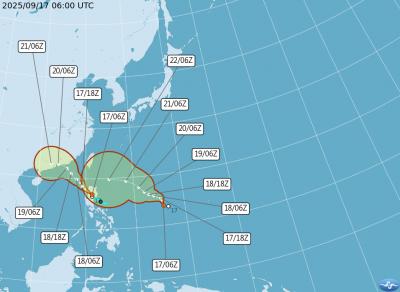
One of two tropical depressions that formed offshore this morning could turn into a moderate typhoon by the weekend, the Central Weather Administration (CWA) said today. Tropical Depression No. 21 formed at 8am about 1,850km off the southeast coast, CWA forecaster Lee Meng-hsuan (李孟軒) said. It is expected to move in a northwesterly direction as it continues building momentum, possibly intensifying into Typhoon Mitag this weekend, she added. The radius of the storm is expected to reach almost 200km, she said. It is expected to approach southeast of Taiwan on Monday and pass through the Bashi Channel between Tuesday and Wednesday,
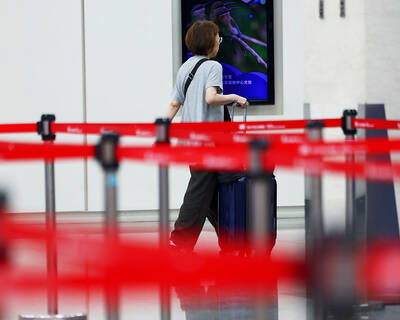
About nine Taiwanese are “disappeared,” detained, or otherwise deprived of freedom of movement in China each month, the Mainland Affairs Council (MAC) said yesterday. Between Jan. 1 last year and Aug. 31 this year, 188 Taiwanese travelers went missing, were detained and interrogated, or had their personal freedom restricted, with some questioned in airports or hotel lobbies, the council said. In a statement ahead of the Mid-Autumn Festival, the council urged people visiting China for any reason to be highly vigilant and aware of the risks. Of the reported cases, 50 people were “disappeared” after entering China, 19 were detained and 119 had